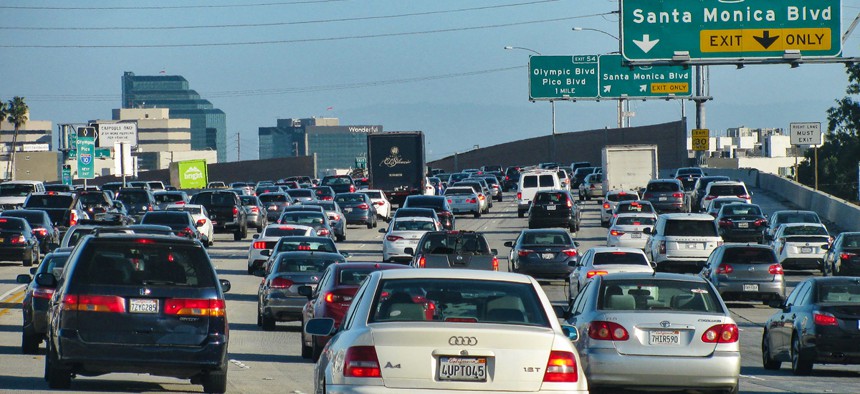Connecting state and local government leaders
COMMENTARY | "Any legislative or policymaking approach to climate that fails to see the connections between emissions, how and where we build, and our transportation infrastructure decisions, will be destined to fail."
Whether it’s in the Green New Deal, the recent climate and transportation hearing before the House Transportation and Infrastructure Committee, or the President’s mythical infrastructure bill (perpetually “coming soon!”), I am heartened to see infrastructure and climate change together in the national conversation about our country’s greatest challenges.
But wherever these proposals are being debated, most of them, including the ambitious Green New Deal, make the same two basic mistakes.
First, they ignore the full impact of land use (how and where we develop our land) as a critical part of the solution to climate change. Second, they treat climate change and our infrastructure choices as separate, disconnected challenges rather than interconnected problems that could be best solved together.
We know that building denser, walkable, mixed-use, and mixed-income places near existing transit and other infrastructure can not only improve people’s lives but also reduce vehicle miles traveled and the resulting climate-warming emissions. But federal financing tools often prevent these types of walkable, transit-oriented developments from being built. Many of the brightest lawmakers in Washington fail to see that existing federal infrastructure policy and programs are driving the growth in the transportation-related emissions fueling our climate crisis. While other sectors have seen improvement, transportation emissions are continuing to climb.
It’s no mystery why: 83 percent of all transportation emissions come from driving, and federal transportation policymakers have spent the better part of the last 50 years trying to see just how much driving we can encourage.
Better transportation technology won’t save us either. I know that technological marvels excite us—look no further than our fixation on automated vehicles, but shiny technological solutions are metaphorical drops in the bucket when it comes to climate change.
For example, we pin a lot of hope on the distant promise of electrifying all of our vehicles—a monumental challenge in itself. Even if California managed to convert to an all-electric fleet and 75 percent renewable energy, they would still have to reduce overall driving by 15 percent beyond what their current plans project in order to hit their statewide emissions targets.
The hard truth is that we cannot truly tackle the climate crisis without a federal infrastructure policy that reduces driving. We don’t need to ban cars, Ubers or AVs, we just need to upend the federal policies that require most people to need one of them just to participate as a member of our economy.
So what’s the secret to reducing driving? Smarter land use.
What if, instead of clutching our pearls about autonomous vehicles, we built places where people of all incomes and races could live, work and play without having to use a vehicle for every single trip—whether it’s driven by Google or not? If we take an approach where we build places in a way that reduces the need for commerce and commuters to travel in a vehicle, and build those places where the infrastructure and people already exist we can truly impact climate change while also dramatically improving people's lives.
Instead, our federal transportation policy rewards states that build more miles of highways and increase vehicle miles traveled with yet more federal transportation dollars to do more of the same.
Other existing federal policies also work against our stated goals of reducing emissions. Take the new federal Opportunity Zones tax incentive intended to jumpstart investment in low-income areas. Unfortunately, the bulk of the census tracts designated as Opportunity Zones by states consist of sprawling areas, undeveloped greenfields, exurbs, and rural areas.
Without improved federal guardrails and effective state and local incentives, billions in Opportunity Zone capital could soon be used to incentivize new development in places far from existing infrastructure, jobs, schools or social services. This will only encourage yet more driving—or require expensive new infrastructure to serve it.
The Green New Deal proposes many worthy solutions. But we need to legislate, make policy, and think in a more interconnected fashion. It will be a waste of time to attempt to slash emissions with our climate policy if we continue to subsidize new highways and encourage yet more driving with our federal infrastructure policy, and incentivize sprawl with our land use policies and federal financing tools.
The existential threat that we face today is a product of continuing to incentivize our bad land use and transportation choices. But the solution can be found—in part, at least—by unifying our infrastructure investments, land use choices and climate change solutions.
Any legislative or policymaking approach to climate that fails to see the connections between emissions, how and where we build, and our transportation infrastructure decisions, will be destined to fail.
Calvin Gladney is president and CEO of Smart Growth America.

NEXT STORY: A Suburban Community Rejects Transit Expansion



